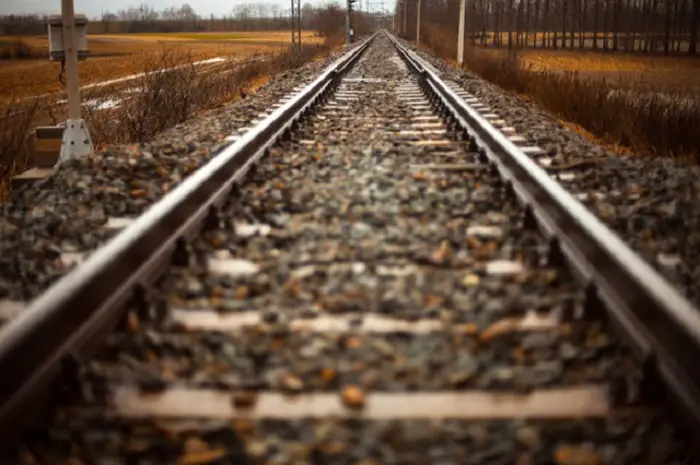The Ghana Railway Development Authority (GRDA) and the Ministry for Railway Development are confident that the new Accra-Nsawam railway project will begin construction soon. It is said that the standard gauge railway line project is meant to replace the current narrow-gauge railway line once it is completed to facilitate the faster shipment of large cargo.
The new Accra-Nsawam railway project, expected to be constructed by KEC International Limited, an Indian organization, would run for roughly 43 kilometers from Accra to Nsawam, a key commercial hub that connects the country’s south to the Middle Belt.
The Senior Members of the contractor assigned to the new Accra-Nsawam railway project, KEC International, consisting of Praveen Goyal (Senior Vice President), Gulzar Miglani (General Manager), and Kaushic Khanna, reassured the Minister for Railway Development, John-Peter Amewu, at a recent meeting held at Hohoe that plans for the project’s implementation had progressed.
Processes taken to ensure the seamless start of the New Accra-Nsawam Railway Project
During the meeting, they highlighted the important processes they were taking to ensure the project’s seamless start. The confirmation that they had reached a later stage of negotiations with lenders for the project’s financial arrangement was critical. Mr. Amewu praised the contractor for the work that had been done so far and emphasized the amount of dedication and importance that the government places on the initiative, given that it will generate employment, promote economic growth, and improve citizens’ lives.
According to the minister, the new Accra-Nsawam railway project will operate in specified stations and urban areas, offering immediate relief to the people by providing a quicker form of transportation.
John-Peter Amewu, reassured them of the government’s backing and reminded them to complete the project in a precise and timely manner. KEC and GRDA inked a contract for the railway line, although it has yet to begin since certain contract precedents must be met before the project can begin.
Reported ealier
Jan 2019
US $3.1m Accra-Nsawam railway line in Ghana to commence operation
Operations on the US $3.1m Accra-Nsawam rehabilitated train service in Ghana is set to commence by the end of January 2019. This is according to the Chief Executive Officer of the Ghana Railway Development Authority, Richard Dombo.
“We are only remaining with the test runs and as soon as they are done the train service will be ready and working by the end of January 2019,” said Richard Dombo.
Mr. Richard further added that a section of the Kotoku-Nsawam line will require additional works to be done to strengthen the structural integrity of the track, dealing with encroachment and removal of unauthorized level crossings which resulted in the delays to commence the Accra – Nsawam shuttle service before the end of 2018 as planned.
Also Read: Construction of US $9.5m Trans-Kalahari railway to commence
Free train services
Ghana Railway Company Limited is still running free services for rail commuters which started on January 8 and would end on January 19 on the Tema-Accra line as part of its 120th Anniversary Celebration. Passengers will pay US $1 as a standard rate afterward.
Moreover, the CEO of the Ghana Railway Development Authority said that rehabilitation work on the 56 km narrow gauge line from Kojokrom to Tarkwa through Nsuta is nearing completion, and will lead to the restoration of passenger rail services from Tarkwa to Takoradi for the first time since 2007.
“The freight service from the manganese mine at Nsuta to Takoradi is in operation, and the ongoing rehabilitation has also led to a spectacular reduction in the number of derailments and incidents that occur on the line,” said Mr. Dombo.
The Accra-Nsawam railway
Rehabilitation of the Accra-Nsawam railway line became necessary following a derailment of an Accra-bound Diesel unit. The ministry decided to rehabilitate sections of the Eastern line. The contract was signed in 2017 and was expected to be completed in seven months but extended due to unforeseen circumstances. Reviving Ghana Railways Company Limited gave 300 young people permanent work.
Mr. Joe Ghartey, the Minister for Railways Development revealed that construction of the new standard gauge Eastern Rail Line will commence soon after the rehabilitation.
Aug 2019
Rehabilitation of Accra-Nsawam railway in Ghana nears completion
The rehabilitation of the Accra-Nsawam railway in Ghana is 95% complete. The US$ 3.1m upgrade was supposed to be completed in seven months but the deadline was extended due to unforeseen circumstances.
The line serves as a means of transportation for residents of Nsawam traveling to the Central Business District (CBD) of Accra, but activities on the line ceased in October 2017 when a Tema-Accra-bound train derailed at Tesano. Ghana Railway Company Ltd (GRCL) is in charge of the project.
Accra-Nsawam railway line
According to the Managing director of the Ghana Railway Development Authority (GRDA), John Essel, the railway line will resume normal operations in September. “The Authority has gone on several test runs and is highly satisfied with the quality of work done so far, I can assure you that the operations will resume in the next two weeks or the first week of September. The engineers will have to do some minimal adjustments and also see how to run the Nsawam railway as well as the Tema route,” he added.
The rehabilitation work by GRCL included working on the body, spraying, paneling, seating, and repair of buggies, among others, of the coaches, as well as the lines. The coaches have a seating capacity of 93 passengers for the second class and 56 for the first class.
The Ghana Railway Company Ltd (GRCL) has engaged a team of 300 local workers to work on the project with the workforce consisting of 305 permanent workers and 15 supervisors. Once completed, the railway line will help reduce heavy traffic congestion, ease high road maintenance costs, reduce an increase in fuel consumption, and increase environmental pollution.

Leave a Reply